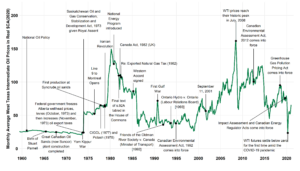This week I set out to try something a little different and wanted to bring some levity to the blog as I have the distinct impression that recent columns have been quite serious and not so much fun. This is to be expected of course given the ongoing drudgery of the pandemic, last year’s lousy energy market and, let’s get real, lots of bad news pretty much all around.
As promised, there will be some fun stuff, but it’s going to have to wait a few paragraphs because the real world has a nasty habit of intruding on the best-intentioned fun and frivolous diatribes. And what was this nasty intrusion you may ask?
Well, as many of us are aware, yesterday was budget day in Alberta, otherwise known as the day when people sit up and say “what the hell just happened”?
And it is very hard to make a budget funny as they are by their very nature dry and without humour. And let’s face it, an Alberta austerity budget? Delivered by a UCP government armed with a scalpel during a global pandemic against a backdrop of a fragilely recovering oil and gas industry being buffeted by ESG, write-downs, skeptical investors and volatile commodity prices? This was never going to be pretty.
That wasn’t always the case. At one time, budget day in Alberta was a time for the government to back the money truck up to the huddled masses and start flinging cash willy-nilly out the door to any and all special interest groups.
In those good old halcyon days, budgeting was easy. Raise spending by X%, promise a shiny raise to all the public service, pat yourself on the back and move on. Of course when you’re in the middle of a resource boom and royalty revenues regularly exceeded $8 billion, life’s a party.
Nowadays? Not so much.
Budgeting now is about making hard choices, both monetary and political. Showing steely resolve to make unpopular decisions that may cost you at the ballot box but will put a province in need of a secular change in attitude on track to emerge from its financial predicament with a new, fiscally stable platform that will take it forever off the commodity price and royalty revenue roller coaster.
Yeah right.
Look, I have no desire to do a deep dive into all the excruciating detail of the just released Alberta Budget. Trust me, no one wants that. Instead, I’ll try and keep things big picture. The perspective from afar.
Unlike the happy fun times of yesteryear described above, yesterday’s budget was both a whopper and wake-up call. For what seems the 5th year in a row, we have added to a once-slain deficit.
At a hefty pandemic influenced $18 billion or so, we have a big hole to dig out of.
And, generically, as budgets go, it had its moments.
There were some aspirational and grandiose turns of phrase, nods to the technology sector, some pretty cold water and shade thrown the way of the civil service, a bone for health care and a ritual crushing of the spirit of post-secondary education. And finally, of course, this being Alberta, NO NEW TAXES because who in their right mind would raise taxes during a pandemic when people are suffering!
And on the royalty front, we have what we always have, a hoped for energy recovery that may or may not result in the deficit being smaller than expected sooner than never. This time with a built-in relief valve because instead of using energy prices that are well ahead of consensus forecasts (like last year), they are projecting royalties based on an average price deck lower than what was realized in calendar 2020. Clever. There is upside.
But really, same-old, same-old.
This UCP budget, like the last year and the year before and the NDP before them, missed a glorious opportunity to in one fell swoop solve the revenue conundrum for future generations by failing to address the tax question.
Currently here in Alberta we are blessed to have among the lowest personal and corporate taxes in North America. This is a good thing, not a bad thing. That means that there is room to reset taxes without impairing our competitive position.
And I don’t disagree that we have a legacy level of public services that cost more (and deliver more) than other provinces. That’s the legacy of being a wealthy “have” province. Doesn’t mean that services should be the be all and end all target. I talk to people. There isn’t a huge groundswell of people demanding less service. And to be frank, there is not enough meat on the bone anyway to make a significant dent in the spending side without being wilfully cruel and crushing services.
As has been relentlessly discussed, the royalties we have relied on have been drastically diminished since 2015 and while the recently rallies in commodity prices are going to help, they won’t go anywhere near far enough fast enough to bridge the current gap between what we spend and what we need in revenue to balance the budget. Based on the government’s own projections, royalty revenue for this budget year is going to be less than the interest paid on debt!
We take in less in taxes than we spend on health care.
And raising personal taxes or reversing corporate tax cuts? There’s no magic bullet there either. Bridging the gap through existing measures doesn’t work.
Nope, it’s got to start with a sales tax.
Look, I get it. No one wants to be sacrificed on the altar for having introduced a new toxic to Albertans tax during a pandemic, but someone’s got to do it. And it is long past time.
And absolutely, it would be unpopular (at first). But is there anything the UCP has done that IS popular? They are in the middle of their term and are as unpopular as any government in a liberal democracy can be. They literally have nothing to lose by doing the right thing.
I did a blog on this last year and it still stands. If Alberta ever wants to get its fiscal house in order now and for the future, the predictable revenue stream of a consumption tax gets you there.
It’s not all or nothing. You still need to take steps to rein in spending. But without this? It’s smoke and mirrors. You’re rearranging deck chairs.
This was a missed opportunity for bold thinking.
An opportunity to reset Alberta’s fiscal path. An opportunity to present a bold and forward vision for the province. An opportunity to reinvent the UCP and, likely, guarantee re-election in 2023. Because we would be on a sure path to a balanced budget.
In closing, I know political parties like to post shadow budgets, so I had prepared one of my own distilled down to key items. Since I knew it was never going to be looked at, I kept it to myself. But for fun, here it is. Feel free to comment.
My Shadow Budget:
- Implement a 5% HST
- Bring the carbon tax back to the province so all the money stays here
- Re-introduce means tested health care premiums
- Reduce personal income taxes by 2% in each bracket
- Reset corporate income taxes from 8% to 10%
- Freeze program spending at current levels for the next two fiscal years and let inflation do its work
That is all.
Alright then. That was fun, wasn’t it? Didn’t think so. Hopefully this next part is lighter.
It has recently come to my attention that Esteemed Researcher, Legal Scholar, Environmental Economist, Academic and beer and cycling enthusiastTM Professor Andrew Leach, currently of Edmonton, Alberta prepared a highly useful and critically important energy history chart (see below), plotting the monthly price of WTI (West Texas Intermediate) starting in 1960 and running to present day and overlaying key moments in Canadian energy history.
It is all very thought provoking and particularly interesting to note all the critical inflection points and try and figure out what was happening at these points in time and how they impacted the price of oil. And doubly so to see this laid out in the context of the Canadian historical trajectory.
That said, and not to infringe on the inestimable professor’s most excellent work, I felt it was my duty as a Canadian and an energy industry participant (not to mention history buff) to do a little background research of my own, the goal of which was to search for alternative historical precedents that may have influenced or been impacted by the price of our favourite commodity over the past 60 years.
Plus, it gives us all an opportunity to do a decidedly revisionist dive into Canada’s sordid oil history.

Let us begin
For the sake of everyone’s sanity, I am going to confine myself to the very “key” historical events.
1961 – National Oil Policy.
Not to be confused with the National Energy Program. This policy was implemented to establish a market for Alberta oil in Eastern Canada. In essence, west of an arbitrary line oil for refining was supposed to come from Alberta, while east of the line refiners were allowed to import it. Kinda the same as it is today to be perfectly honest. Is this then the original sin of West to East pipelines? On the other hand, in 1961, the NDP was founded and Wayne Gretzky was born.
1965 – Stuart Parnell Born
Far be it from me to dispute the importance to the energy industry of this singular event, however, 1965 also saw the adoption of the Canadian flag and a massive power failure that encompassed virtually the entire east coast as well as southwest Ontario due to a power system failure in Ontario. In Ontario on a fact-finding mission, the Texas Railroad Commission (the regulator for the Texas Power System) notes the importance of a reliable and protected power grid.
1967 – Great Canadian Oilsands Plant Construction complete
Clearly a singular event in the history of the oilsands, this is the beginning of it all (the beginning of the end?) for the province of Alberta. However, any student of history will know that the last time the Toronto Maple Leafs won the Stanley Cup was on May 2nd in 1967. The GCOS operations started officially on September 30th 1967. What this means of course is that the Toronto Maple Leafs have never won the Stanley Cup while there have been commercial oilsands operations. So, to all you Federal government-hating conspiracy theorists and the Committee investigating foreign influence in the oil sands, I think we now know who really wants to shut down the oilsands. Leafs fans. Shudder.
1976 – Line 9 to Montreal Opens
Running from Sarnia to Montreal, Line 9 was a critical source of crude oil to Montreal’s refineries. Remember of course there was that National Oil Program dividing the country and resistance to the Line 9 project was fierce but… but… the Trudeau government expressed their belief that shipping Western Canadian crude to refineries in Montreal was in the public interest and forced it through. Read that one again. Trudeau. Pipeline to Montreal. Forced through.
Also in 1976, the massively over-budget Summer Olympics were held in Montreal amid a fervent separatist movement that chased business out of Quebec and left the province and the city saddled with massive debt and a severely compromised tax base, leading of course to giant equalization draws from resource rich Western Canada and, eventually, a separatist movement in Alberta.
1980 – National Energy Program Introduced
Well, we all know what this was. Designed to ensure energy self-sufficiency for Canada and protect access to cheap oil for the Canadian industrial base in Eastern Canada, the NEP was a reaction to the spikes in oil prices caused by the prior year’s Iranian Revolution, spikes which were expected to continue for the foreseeable future. There was also a nefarious subplot to reset a perceived and emerging fiscal imbalance between the west and the east.
Unfortunately, the market did not cooperate and the NEP was quickly followed by an inevitable collapse in energy prices and investment, relegating Alberta to the biggest sector downturn it had seen in its history and wouldn’t see again until 2015/16. Needless to say, it wasn’t a very popular program. Also of note in 1980, the Calgary Flames relocated from Atlanta, Terry Fox started his Marathon of Hope and the Province of Quebec voted no in the first separation referendum in Canadian history. So it wasn’t all that bad a year.
1982 – Final Text of 92(A) amendment to the Constitution Act
This is the famous constitutional amendment that represented Alberta’s ultimate act of revenge on Ottawa for having the NEP foisted onto it. 92A gave Alberta ownership of and jurisdiction over the development of its natural resources and allowed for the reinflation and recovery of its mortally wounded energy industry, paving the way for decades of profligate spending, massive royalty income and, for a brief time, Ralph Bucks. Pretty momentous development you would think. But nowhere near as important as June 12, 1982 which was the first draw of Canada’s 6/49 lottery – winning numbers 3, 11, 12, 14, 41, 43, bonus 13.
1992 – Canadian Environmental Impact Assessment Act
This is one of the three versions of the same thing. Canada’s attempt to create a fair and predictable platform to either exploit its natural resources or stymie the development thereof, all depending of course on your particular political bent. Written in 1992 and implemented in 1995, subsequent iterations occurred in 2012 and 2019. All of these years are famous for many other energy related events including, in no particular order the election of Ralph Klein in 1992, the second (unsuccessful) Quebec Separation Referendum, the 200th anniversary of the war of 1812, the discontinuation of the penny (2012) and, in 2019, the election of Jason Kenney and the UCP as well as the beginning of construction of the Pierre Elliot Trudeau Memorial Pipeline (TMX).
2008 – Oil reaches Historic Peak!
Sure, WTI hit $167.30 in June, but the missing data point is that within 6 months, the price had fallen by more than two thirds bottoming out at $51.64 by January 2009. Another key historical energy factoid in that same period is that the price of Natural Gas fell from $14 per MCF to less than $4 per MCF dealing the first near fatal blow to Alberta’s finances as those royalties were super important. Come to think of it, I might have noted that it was around this time that Oil royalties paid to the Alberta government surpassed collapsing natural gas royalties for the first time in decades – a position they haven’t yet given up. There is of course a lesson in here somewhere about eggs and baskets.
2009 – Stormont Founded
Hmm. A bit of an oversight from our esteemed prof.
2018 – Greenhouse Gas Pollution Act Comes into Effect
I know, it’s a bit of a long-winded way to say “Ottawa implements a carbon tax” but that’s what its name was/is. Implemented in June 2018, this act was of course immediately challenged by all the governments that didn’t want to implement their own carbon tax and what followed has been years of court cases, stickers, misinformation and theatre. While not able to move markets on its own, also in June 2018 Doug Ford was elected, the Cannabis Act was passed and Donald Trump had a hissy fit in La Malbaie Quebec during a G7 Summit, consigning Canada to the scrap heap of one-time allies of the United States and dooming us to two more years of irrelevance.
2020 – WTI settles below zero for the first time.
In all honesty, what took so long right? I mean interest rates have bobbled around or below zero in Europe for years so why shouldn’t oil join the party. I have no alternative facts to put on display here. It was a seminal moment in the history of energy prices. Worthy of note, April 21, 2020 is also the day Disney furloughed 100,000 employees.
Projections for April 21, 2021? I am thinking a bit higher. Which is a good thing. What a difference a year makes.
So there it is. Budget rant and a weird tongue in cheek history lesson. What was the point? Well, first off to show how volatile oil prices are, impacting government revenues. Also to show that government continuity and policies pro and anti energy can be implemented and the energy industry trucks along and does its thing.
Also to point out that Maple Leaf fans have reason to want to shut down the oilsands. Alert the War Room.









